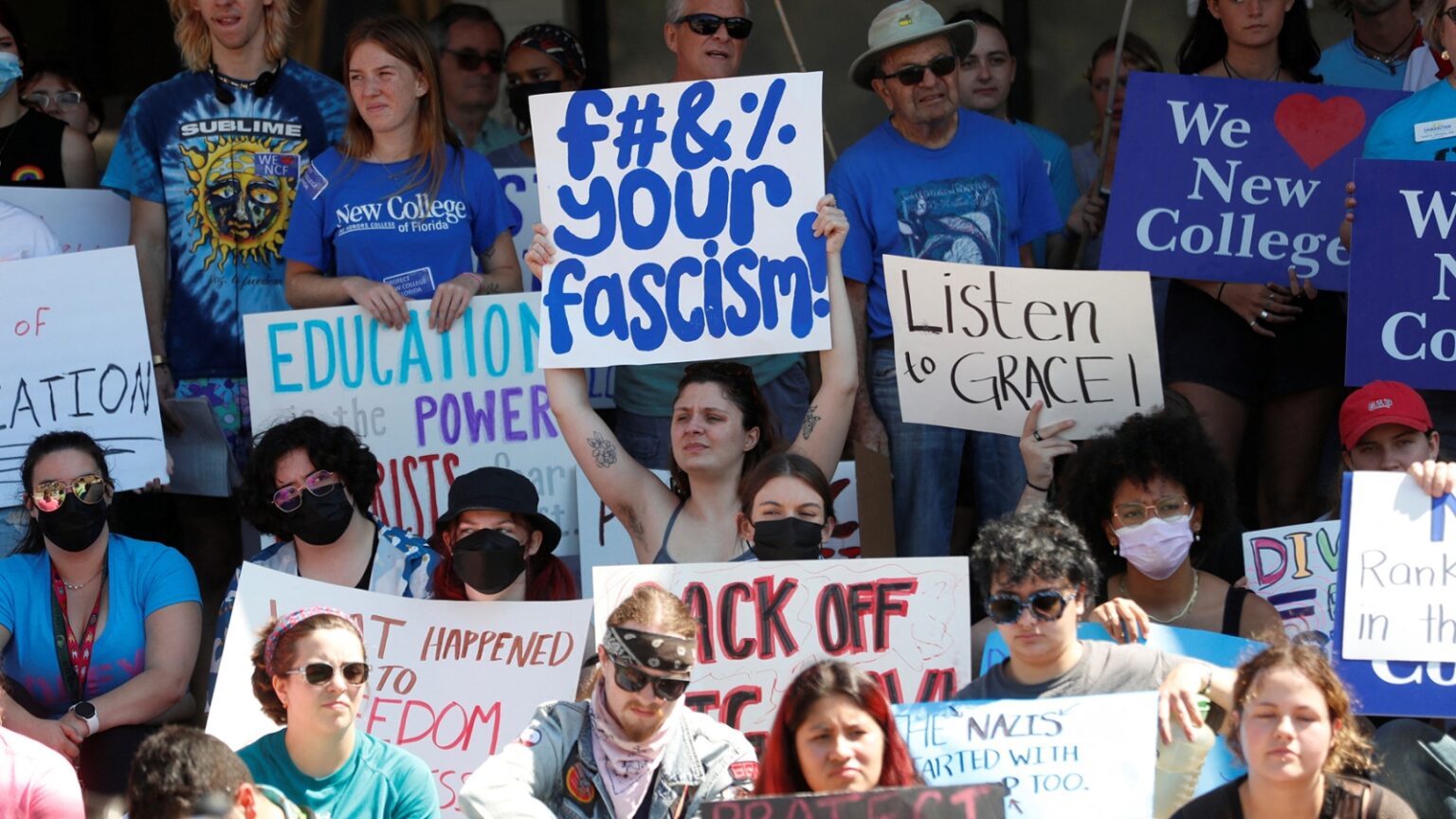Global Courant 2023-05-19 18:20:44
With fewer than 700 undergraduates, New College of Florida’s student body is small enough that most of it fits on one reply-all email thread. On Jan. 6, the day news broke that Gov. Ron DeSantis had installed a knot of culture-war veterans to the school’s board of trustees, that student-moderated email forum lit up. Sam Sharf, a second-year student, remembers the emails flying back and forth: “What the hell is going on?” “How are we going to fight back?” “This is crazy.” Almost as quickly, screenshots of those messages began gleefully circulating on right-wing Twitter, prompting some students to move their communications to an encrypted, invite-only channel, a small cell of resistance that has spent the semester trying to figure out how to save their tiny, public, liberal arts college from what they call a “fascist” takeover.
Set on 110 palm-dotted acres perched on the edge of Sarasota Bay, New College of Florida was founded in the Sixties as an experiment by a band of locals with a shared vision to liberate students and faculty from the “limits of lock-step curriculum .” The school eschews grades, prizes hands-on learning, small classes, and close ties between students and professors. Today, it’s the Florida university system’s honors college, known for producing Fulbright Scholars and more Ph.Ds per capita than almost any other undergraduate program in the country (including Princeton, Harvard, and Yale). The school has never had a competitive intercollegiate sports program, but it does have a mascot: the “null set” — a pair of empty brackets.
New College is also known as a uniquely accepting and supportive place for queer folks — trans students in particular. Students, faculty, and staff have spent years carefully calibrating a climate “supportive of all genders” and “unwilling to tolerate transphobia,” as Emily Fairchild, associate director of undergraduate studies for Harvard University’s sociology department, wrote in a 2022 chapter about New College published in a volume of research on transgender experiences. “The great heartbreak,” Fairchild, who worked at New College for more than a decade, says today, “is that that core mission is threatened by what (the trustees) are doing right now.”
Editor’s picks
In January, DeSantis’ emissaries made New College the site of a brand-new experiment: transforming this “social-justice ghetto,” as new trustee Christopher Rufo dubbed the school, into, as a DeSantis aide put it, a “Hillsdale of the South.” (Rufo, driving force behind the critical-race-theory panic that has gripped the GOP of late, is not an academic, an administrator, an alumnus, or even a Floridian. He is, as one New College student put it, “a terminally-online poster.”) Hillsdale is a tiny Christian college in Michigan whose campus is decorated with statues of Margaret Thatcher and Ronald Reagan, whose graduates have gone on to write Donald Trump’s speeches, hammer out Kevin McCarthy’s strategy, and help draft opinions by Samuel Alito and Clarence Thomas.
The board began by firing the college’s beloved president, Patricia Okker, before forcing out its provost and its chief DEI officer. They disbanded the DEI office entirely and reassigned the remaining employees to new jobs. In Okker’s place, the board installed Richard Corcoran, the former speaker of the Florida House of Representatives, on an interim basis and at roughly double her salary. A longtime Republican aide in Tallahassee and wife of the former chair of the Republican Party of Florida has been put in charge of the college’s foundation. The former president of the Florida Senate was installed as the school’s general counsel. A GOP operative who worked under Corcoran in the DeSantis administration was put in charge of the school’s admissions office. They hired a baseball coach, formerly employed by one of the trustees, to institute a sports program as New College’s athletic director.
Amid all of this upheaval, the students organized rallies, teach-ins, town halls, and trips to Tallahassee to lobby legislators against the changes. But their efforts have done little to slow the takeover of their campus. Conversations with lawmakers have all played out roughly the same way, one student explained: “We hear you, but we disagree, and we’re gonna continue not listening to you.” (A rep for New College says the recent changes “have generally been accepted by the larger campus community.”)
Related
So now, they’re trying alternative means of subverting the top-down changes. Greek life for example, has “not been a part of campus culture — ever,” third-year Chai Leffler says. “But the way that students are going about it is like, ‘All right, if we’re going to have a sports team, let’s make it the gayest, loudest sports team that we can.’ If there are going to be fraternities and sororities, well, there are very LGBTQ-inclusive fraternities and sororities that we can be a part of.” For the first time ever, this year New College is holding a Pride event. (Before DeSantis’ takeover it never felt necessary, Leffler said: “Going to school at New College is a Pride event.”)
The new administration recently sent out an email to students asking them to vote for a new mascot, with several options to choose from including, to several students’ dismay, “the Conquistadors.” They responded by coordinating a write-in campaign to keep the null set, sending out their own survey to ensure the poll results match. “We are really trying to hold on to our culture — like what makes us New College students,” Leffler says. But like every decision on campus this year, the survey turned into a culture war of its own, mysteriously attracting more than 2 million responses and an overwhelming number of votes in favor of changing the mascot to the New College of Florida Snowflakes. (The null set came in second.)
Like a lot of his classmates, Leffler has considered transferring out of New College. (It feels like “almost all of the student body here has considered leaving,” he says.) But he is a Pell Grant and Bright Futures recipient, so his education is essentially free; even with the offers other schools have extended to New College students whose educations have been extended this semester, it doesn’t make financial sense for him to leave.
Trending
At a board meeting in late April, Corcoran said roughly 100 students had enrolled for the 2023 freshman class — a figure he characterized as “a little bit down from last year.” (The ideal size for a New College class, Corcoran said, is closer to 400.) He chalked up the discrepancy to the bad PR: “This transition (has) been highly publicized, and so in some ways that could be a threat to our admission numbers.” The board also announced it was denying tenure to all five faculty members who applied — a decision expected to result in a faculty exodus this summer, too. In May, the gender-neutral signs on campus bathrooms began disappearing — with a DIY sharpie version sometimes appearing in their place. A new vendor started serving coffee out of the campus cafe in cups affixed with a Bible verse.
For students like Leffler with no choice but to stay, the changes are only hardening their resolve. On the encrypted thread there is talk of occupying buildings on campus, among other direct actions. But for everyone else, leaving may end up being the most powerful act of all. Says Madi Markham, a fourth-year graduating this spring, “I think (the board) kind of didn’t consider the fact that, like, they need students to run a school.”




